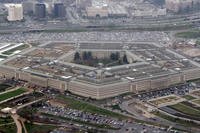The Biden administration and a coalition of more than 50 advocacy groups pledged Wednesday to do more to support the children of military caregivers.
The announcement, made the day before Veterans Day, came at a White House event hosted by first lady Jill Biden as part of her Joining Forces initiative. She started the program, which is aimed at helping military families, as second lady in 2013 and revived it this year when she returned to the White House.
"We can't shield our caregiver kids from the reality of war or its aftermath," the first lady said. "We can and we must give our military and veteran caregiving families everything they need to care for their wounded warrior with compassion, dignity and love. We must bring hidden helpers' service out of the shadows. Let their light shine bright and give them the support that they need to survive."
She was joined by Department of Veterans Affairs Secretary Denis McDonough, Defense Secretary Lloyd Austin and former Sen. Elizabeth Dole, who founded the Elizabeth Dole Foundation to support military caregivers.
Read Next: 100 Years of the Tomb of the Unknown Soldier
Wednesday's launch of programs for what's being called the Hidden Helpers Coalition is meant to respond to a study released in conjunction with the White House event that looked at the effects of being in a caregiver family on children.
The study, commissioned by the Elizabeth Dole Foundation and conducted by research firm Mathematica, found that about 2.3 million children in the United States are living with a disabled veteran, based on an analysis of the Census Bureau's American Community Survey.
Those children are more likely to experience social isolation, have trouble learning in school and develop health problems such as stress and fatigue, according to the research. The study also found children want more support to navigate their roles as "hidden helpers" and that their needs "can get lost in their family's response to the needs of the care recipient."
One child, Gabby Rodriguez, 9, spoke Wednesday about what it is like growing up after her father, Marine veteran Jorge, was hit with an improvised explosive device in Iraq and left with hearing loss, a traumatic brain injury and post-traumatic stress disorder.
"I would go to the play and ask other kids, 'Was your dad in the military? Does he have a wound on his brain?' It was three long years [later] when I was at a veteran family retreat for military kids that I finally made my first friend that said, 'Yes,' to both of those questions. It was a huge moment for me," Gabby said, alongside her 6-year-old sister Ava.
"I want every other caregiver kid out there to know that there are millions of us. You are not alone," Gabby added.
To address the stressors and gaps in services for caregiver children, the White House is convening a cross-agency working group to write a report outlining plans for future research and identifying areas of collaboration between agencies to better support military and veteran children in caregiving homes, according to a White House fact sheet.
The DoD and VA also will hold a meeting focusing on ways the departments can better support families and children during the transition out of the military, the fact sheet said.
"I want to say a few words to the kids here today," Austin said at the event. "We know that you sometimes worry about your mom and dad. We know how much you miss when they're not at home. And we know that you take on a big responsibility toward your family. So the grown-ups in the room today are going to be there to support you because your love and your strength helps keep our country strong."
The VA also plans to implement a Family Coordinator Program so social workers can connect veterans with support for their spouses and children, according to the fact sheet. And it will work with the departments of Education and Health and Human Services to develop tools for educators to better support children in caregiving households.
The Pentagon has committed to training all non-medical counselors within the Military OneSource and Military Family Life Counselor programs on the needs of children and caregivers, as well as working next year with the Uniformed Services University of the Health Sciences to better understand where and how military children are accessing mental health care.
Among the commitments revealed Wednesday by private organizations, the Wounded Warrior Project announced a dedicated fund of $1.5 million for the Hidden Helpers Coalition. The USAA Foundation Inc. committed more than $1.4 million in 2022 to support military caregivers and children, while the Bob and Dolores Hope Foundation will give $500,000 to the Elizabeth Dole Foundation's caregiver emergency financial relief fund.
Other groups joining the coalition include Sesame Workshop, which will work with the Elizabeth Dole Foundation on messages its characters can share about military caregiving; the American Red Cross, which will launch a "resiliency workshop" for caregiver children to meet with mental health professionals; and Esposas Militares Hispanas USA, which will provide Spanish translation services to the coalition.
-- Rebecca Kheel can be reached at rebecca.kheel@monster.com. Follow her on Twitter @reporterkheel.
Related: Future First Lady Jill Biden to Relaunch Military-Focused Joining Forces Initiative













